Domenico Passignano (original) (raw)
Passignano
Bathers at San Niccolo
The Virgin with Saints Lucy John the Baptist and Catherine of Alexandria with a Donor
Drawings
The Head of a Youth
God the Father with Putti and Angels below three Saints and a Boy in Contemporary Dress
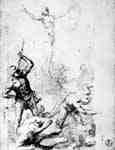
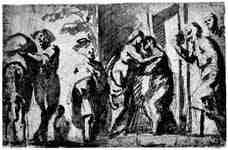
Encounter between Mary and Elizabeth
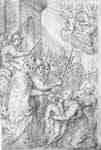
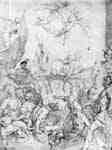
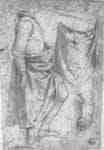
Study on the character of a courtier

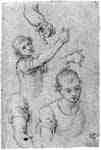
Studies on the figure of a boy
Domenico Passignano (1559 – 17 May 1638), born Cresti or Crespi, was an Italian painter of a late-Renaissance or Counter-Maniera (Counter-Mannerism) style that emerged in Florence towards the end of the 16th century.
Sketch of Charity flanked by Glory and Happiness, circa 1608.
Biography
Cresti was born in Passignano, currently a frazione of Tavarnelle Val di Pesa about 30 km south of Florence, and was educated by the local Vallombrosan monks. He started his works in the stylized Tuscan manner, working with Giovanni Battista Naldini and Girolamo Macchietti. After travelling from Rome to Venice (1581–1589), he came under the influence of Tintoretto's style. He had traveled to Venice as an assistant to Federico Zuccari, who had employed him previously in the completion of Vasari's unmemorable frescoes for the Florentine Duomo.
He was known to paint with great speed; however, as he used less paint in order to work quickly, most of his works have been severely damaged by time. As a result of this gift, he was nicknamed Passa Ognuno ("[He] Passes Everyone") – a possible play upon the name of his birthplace.
In Florence, he painted frescoes of the Translation and Funeral of Saint Antoninus (1589) for the Cappella Salviati in San Marco and Preaching of John the Baptist (1590) for San Michele Visdomini. He painted a Nativity (1594) for Lucca's Duomo di San Martino. Other works can be found in church of San Frediano in Pisa as fresco and in Uffizi Gallery. He painted famous portraits of Galileo and Michelangelo.
Among his pupils were the brothers Valore, Domenico Casini,[1] Pietro Sozzi (Siena 1556-1622),[2] and Cesare Dandini.
Passignano died at Florence in 1638.
Selected works
Ganymede and Jupiter, University Oklahoma Museum of Art [1]
The Allegory of Chastity, [2]
Wedding Banquet of Grand Duke Ferdinand I de Medici, [3]
Sources
Freedberg, Sydney J. (1993). Pelican History of Art, ed. Painting in Italy, 1500–1600. Penguin Books Ltd. pp. 625–626.
W Herbermann, Charles, ed. (1913). "Domenico Passignano". Catholic Encyclopedia. New York: Robert Appleton Company.
Biografia universale antica e moderna ossia Storia per alfabeto della vita; page 227.
Dizionario ragionato delle voci delle arte del disegno architettura, pittura, scultura ed industrie affini, (1888), by Giuseppe A. Boidi, page 367.
External links
Orazio and Artemisia Gentileschi, a fully digitized exhibition catalog from The Metropolitan Museum of Art Libraries, which contains material on Domenico Passignano (see index)
Artist
A - B - C - D - E - F - G - H - I - J - K - L - M - N - O - P - Q - R - S - T - U - V - W - X - Y - Z
Retrieved from "http://en.wikipedia.org/"
All text is available under the terms of the GNU Free Documentation License




